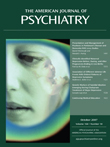Insulin and Insulin-Like Growth Factor-1 Abnormalities in Antipsychotic-Naive Schizophrenia
Abstract
Objective: The purpose of this study was to examine the evidence for the insulin-like growth factor-1 (IGF-1) deficiency hypothesis in the pathogenesis of schizophrenia. Method: The authors examined the fasting plasma levels of glucose, insulin, IGF-1, and cortisol in antipsychotic-naive schizophrenia patients (N=44) relative to age- and sex-matched healthy comparison subjects (N=44). Patients and comparison subjects were also matched for anthropometric measures and physical activity. Results: Schizophrenia patients had a significantly higher mean plasma insulin level as well as a significantly higher mean insulin resistance score relative to healthy comparison subjects. The mean plasma IGF-1 level was significantly lower in patients. IGF-1 levels had a significant negative correlation with plasma insulin levels. The total positive symptoms score as well as the hallucinations subscore had a significant inverse relationship with IGF-1 levels. Conclusions: Deficient IGF-1 might underlie insulin resistance in schizophrenia. The IGF-1 deficit in antipsychotic-naive schizophrenia patients and its significant correlation with psychopathology scores suggest that IGF-1 might be potentially involved in the pathogenesis of schizophrenia.



